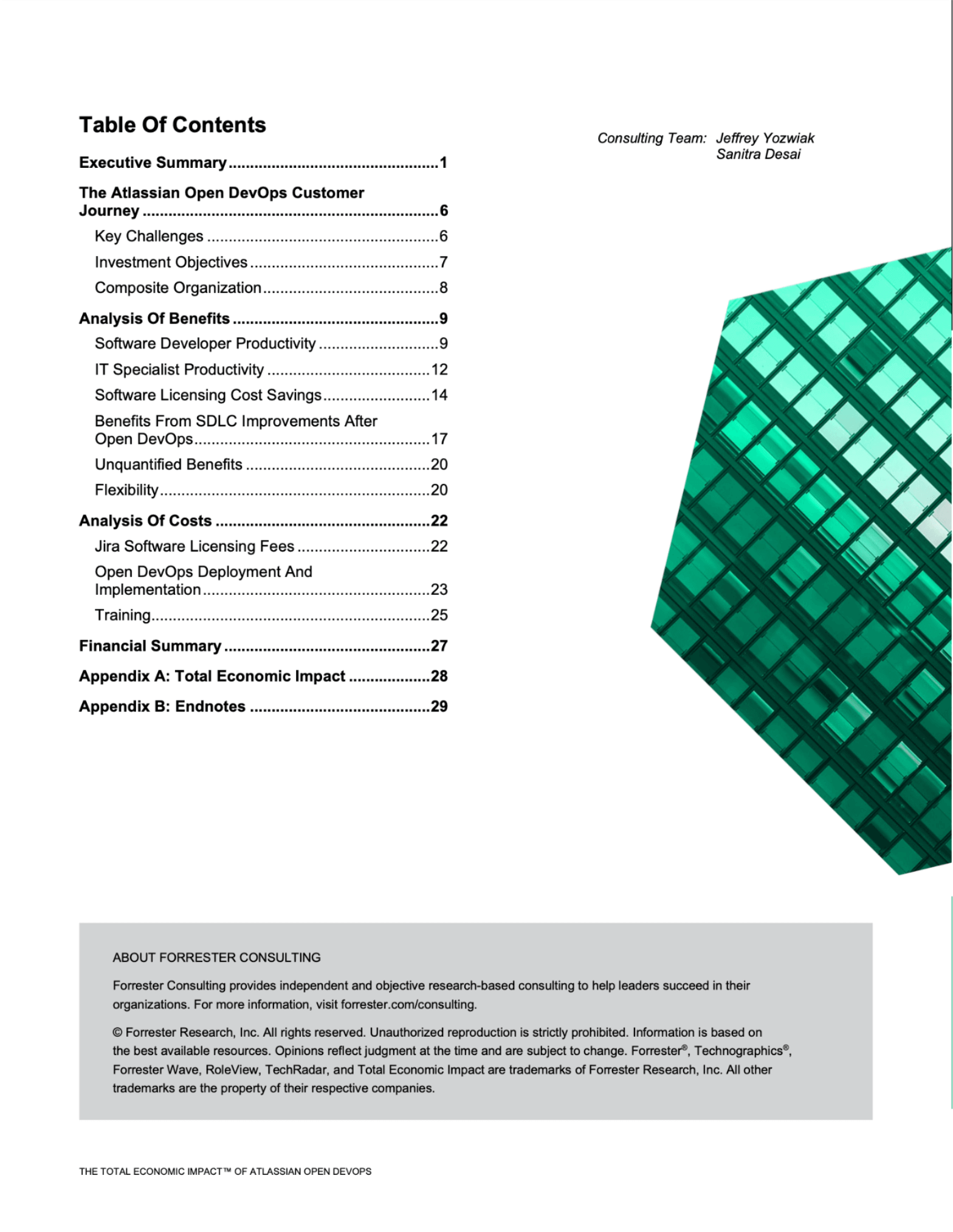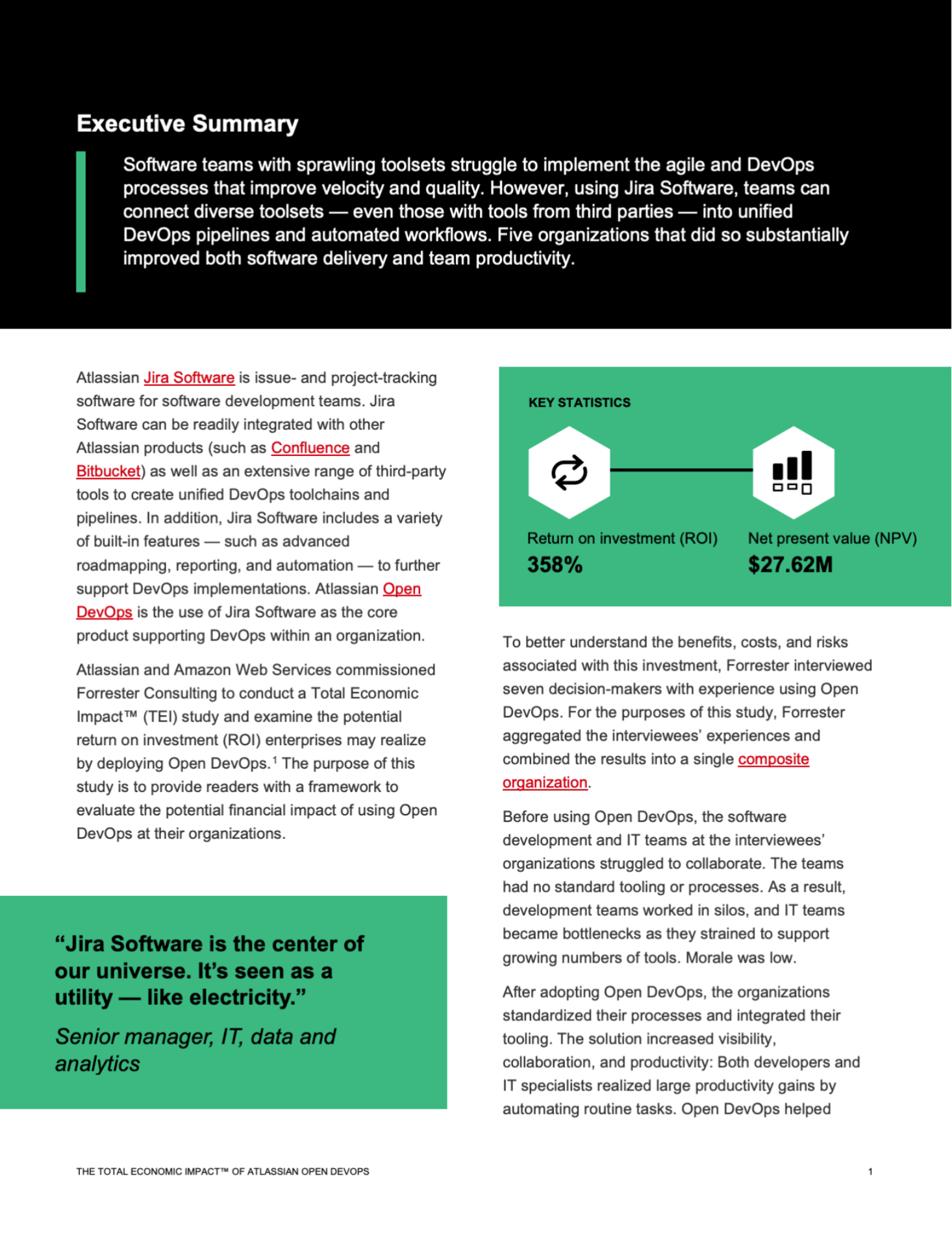
FREE DOWNLOAD
Forrester Study: The total economic impact of Atlassian Open DevOps
Overview
Do you wrestle with a complex array of tools that cause a lack of visibility, security challenges, and silos across teams? One approach to solving this complexity is to use an “all-in-one' DevOps solution offered by a single vendor. The only problem with this approach is that teams often lose agility and developer flexibility. Plus, they sacrifice using the tools they love.
At Atlassian, we believe that DevOps is built, not bought from a single vendor. We empower teams to have the flexibility to choose the tools they use and love in their DevOps solution. Atlassian Open DevOps puts Jira at the center of your DevOps project and allows you to incorporate the tools you already use — from planning, to coding, to incident management. Automated workflows allow you to eliminate tedious project updates, secure your code, and simplify incident resolution.
In this study, commissioned by Atlassian Open DevOps and AWS, Forrester Consulting interviewed five Open DevOps customers who span an array of regions, industries and sizes, to conduct a Total Economic Impact analysis. This study examines the potential ROI teams may realize when using Jira Software as the foundation to an Open DevOps solution. Forrester examined areas such as deployment frequencies, team productivity, licensing costs and how Open DevOps enhanced developer flexibility, and moral. For more information on the findings, download the full study.
The study reveals:
Quantified benefits of teams using Open DevOps
Challenges organizations faced before using Open DevOps
A framework that identifies the cost, benefit, flexibility, and risk factors that affect the investment decision of using Open DevOps
Quotes from customers on impact of using Open DevOps
PDF content preview
The Total Economic Impact™ Of Atlassian Open DevOps
Cost Savings And Business Benefits Enabled By Open DevOps
MARCH 2022
A FORRESTER TOTAL ECONOMIC IMPACT™ STUDY COMMISSIONED BY ATLASSIAN AND AMAZON WEB SERVICES
Executive Summary
Software teams with sprawling toolsets struggle to implement the agile and DevOps processes that improve velocity and quality. However, using Jira Software, teams can connect diverse toolsets — even those with tools from third parties — into unified DevOps pipelines and automated workflows. Five organizations that did so substantially improved both software delivery and team productivity.
Atlassian Jira Software is issue- and project-tracking software for software development teams. Jira Software can be readily integrated with other Atlassian products (such as Confluence and Bitbucket) as well as an extensive range of third-party tools to create unified DevOps toolchains and pipelines. In addition, Jira Software includes a variety of built-in features — such as advanced roadmapping, reporting, and automation — to further support DevOps implementations. Atlassian Open DevOps is the use of Jira Software as the core product supporting DevOps within an organization.
Atlassian and Amazon Web Services commissioned Forrester Consulting to conduct a Total Economic ImpactTM (TEI) study and examine the potential return on investment (ROI) enterprises may realize by deploying Open DevOps.1 The purpose of this study is to provide readers with a framework to evaluate the potential financial impact of using Open DevOps at their organizations.
To better understand the benefits, costs, and risks associated with this investment, Forrester interviewed seven decision-makers with experience using Open DevOps. For the purposes of this study, Forrester aggregated the interviewees’ experiences and combined the results into a single composite organization.
Before using Open DevOps, the software development and IT teams at the interviewees’ organizations struggled to collaborate. The teams had no standard tooling or processes. As a result, development teams worked in silos, and IT teams became bottlenecks as they strained to support growing numbers of tools. Morale was low.
After adopting Open DevOps, the organizations standardized their processes and integrated their tooling. The solution increased visibility, collaboration, and productivity: Both developers and IT specialists realized large productivity gains by automating routine tasks. Open DevOps helped
PDF preview


